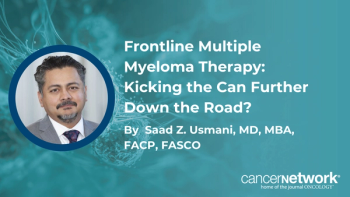
Quiz: What Are Current Management Considerations in Multiple Myeloma?
How much do you understand about evaluating prognosis and choosing treatment for patients with myeloma? Take our latest quiz to find out.
Question 1
Answer
A.True
The prognosis for most patients with myeloma has improved with the use of bortezomib, carfilzomib, lenalidomide, and other agents, but for patients with high-risk disease, prognosis remains poor.[1,2]
References
1. Vangsted AJ, Helm-Petersen S, Cowland JB, et al. Drug response prediction in high-risk multiple myeloma. Gene. 2018;644:80-6.
2. Sonneveld P, Avet-Loiseau H, Lonial S, et al. Treatment of multiple myeloma with high-risk cytogenetics: a consensus of the International Myeloma Working Group. Blood. 2016;127:2955-62.
Question 2
Answer
D.All of the above: complete response, progression-free survival, and overall survival
Bortezomib and carfilzomib are associated with improved complete response, progression-free survival, and overall survival in myeloma patients with t(4;14) and del(17/17p), and lenalidomide might be associated with improved progression-free survival in these patients, according to a 2016 consensus statement by the International Myeloma Working Group (IMWG),
Question 3
Answer
A.True
These patients represent a heterogenous population with an unmet need for more effective treatment options.[1]
Reference
1. Sonneveld P, Avet-Loiseau H, Lonial S, et al. Treatment of multiple myeloma with high-risk cytogenetics: a consensus of the International Myeloma Working Group. Blood. 2016;127:2955-62.
Question 4
Answer
C.Ten or more years
"Response to treatment and survival of newly diagnosed MM is heterogeneous, with median overall survival ranging from 2 to > 10 years," reported authors of the 2016 International Myeloma Working Group (IMWG)
Question 5
Answer
A.Prognosis
In general, these GEP signatures "are useful for prognostication, whereas prediction has to be validated," according to the 2016 International Myeloma Working Group
Newsletter
Stay up to date on recent advances in the multidisciplinary approach to cancer.






































